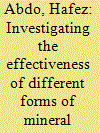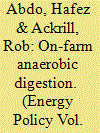| Srl | Item |
| 1 |
ID:
127190


|
|
|
|
|
| Publication |
2014.
|
| Summary/Abstract |
After 40 years of oil investments, the UK is now a mature oil province. During these 40 years or so, the UK Government has changed the type of governance it uses to manage its petroleum resources. This paper introduces the theoretical background to two models of mineral resource governance: proprietorial and non-proprietorial regimes. It investigates how adoption any of these two models by the UK Government has historically affected the achievement of the objectives of the UK petroleum fiscal regime. The analysis tracks the changes in the governance of the UK petroleum resources using changes in the average petroleum tax rate, and how this last influenced the achievement of the objectives of the UK petroleum Regime. The findings remain significant for their policy implications. The study concludes that the UK Government adopted a proprietorial type of mineral governance during the period 1975-1982, before changing to a non-proprietorial regime in the period 1983-2000. Since 2000 it has begun to move back towards a proprietorial style of governance. The excessive use of one type of these modes of governance leads to the objectives of the UK petroleum fiscal regime being not met.
|
|
|
|
|
|
|
|
|
|
|
|
|
|
|
|
| 2 |
ID:
178810


|
|
|
|
|
| Summary/Abstract |
In recent years, the multifunctionality of farming activities and diversification of on-farm income sources have increasingly included renewable energy generation. The uptake of on-farm anaerobic digestion (AD), however, continues to lag behind other renewable energy activities. Moreover, on-farm AD is not only a source of renewable energy, but also a means of farm waste management and thus a means of enhancing environmental quality. This paper provides an in-depth analysis of the policy barriers that might explain this limited uptake, and identify key directions for future AD policy design. We draw on a mixed-methods research design, with data collected by questionnaires, interviews and a round-table workshop of stakeholders. We analyse our data using a framework that disaggregates ‘policy’ into meta, meso and micro levels of Policy Means and Policy Ends. We conclude that future policy must recognise the synergies between on-farm AD as a source of renewable energy and as a means of waste management, reflected in instrument mix and instrument calibration. Calibration-stability is also found to be of critical importance. We also offer new insights and understanding around the application of our chosen policy framework, notably how it can analyse policies that are nested within large, complex policy systems.
|
|
|
|
|
|
|
|
|
|
|
|
|
|
|
|
| 3 |
ID:
098600


|
|
|
|
|
| Publication |
2010.
|
| Summary/Abstract |
Starting with evidence that United Kingdom Continental Shelf oil and gas companies have benefitted very disproportionately from the recent period of extraordinarily high oil prices, this paper traces the history of this weakness in the UK's petroleum fiscal regime. Evidence is provided that the progressive relaxations in the UK's petroleum fiscal regime in 1983, 1987-1988 and 1993 were: largely unnecessary to stimulate the development of new, smaller, 'marginal' fields; misguided in their assumption that such fields were more costly to develop than earlier counterparts or larger contemporary fields; and impotent compared with the effects of oil price movements. The paper concludes with a conceptualisation which illuminates why these failures of policy were not just random: they emerged from the UK's 'non-proprietorial' stance with respect to the country's oil and gas resources, a stance which assumes responsibility for oil company profitability and vainly tries to counter market forces at the expense of government revenues.
|
|
|
|
|
|
|
|
|
|
|
|
|
|
|
|